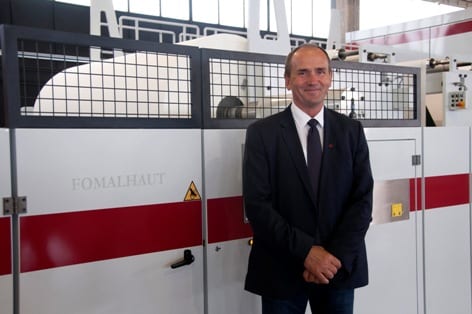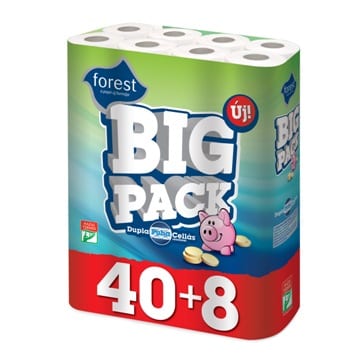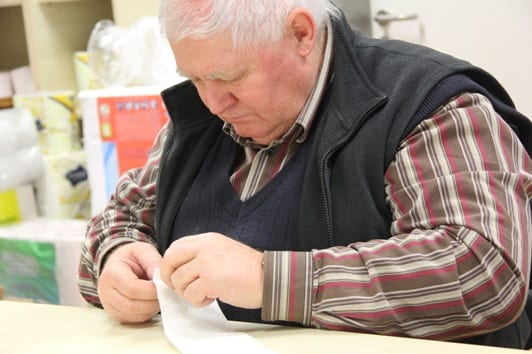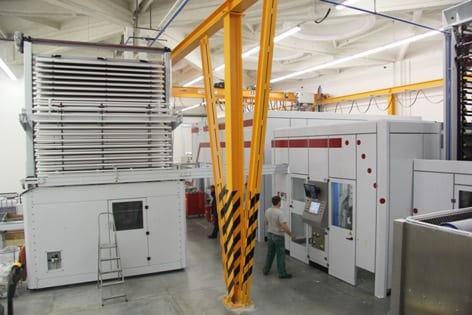A new converting line will give Forest Papir of Hungary a powerful boost for competitiveness and innovation. A TW report.
The uneventful transformation into a market economy which Hungary experienced just over 20 years ago, and subsequent membership of the European Union, is in marked contrast to the dynamism of the many businesses which took shape as a result.

Forest Papir makes the ideal case study for Hungary’s economic evolution.
Co-founder and main shareholder Ferenc Bodrogai had worked his way up from machine operator to commercial director in the state-owned enterprise Piszke which supplied 85% of the country’s tissue. He left voluntarily when the business was sold to a private investor. “I was certain that I didn’t want to deal with paper in the future,” says Bodrogai with a self-deprecating smile. He could not ignore the opportunities in tissue, however, and 20 years later, with a group turnover of some 45 million Euros, 80% of which is in tissue, Bodrogai’s decision to overcome his initial desire to break free of paper has been thoroughly vindicated.
“When we started in 1994 we had no debts, but nothing else either,” says Bodrogai. “All that we had was in our heads.”
BUILDING THE BRAND
For the first 10 years, the business was built up with finished tissue products sourced from Italy which were sold in Hungary under the Forest Papir Brand. “We didn’t have our own products, but our aim was always to supply to tissue sectors in which we could excel and differentiate ourselves,” says Bodrogai.

Since 2000, napkins have played an important part in the story. The proportion of napkins in the tissue market at only 7% is too small to attract the interest of big players, but the level of innovation required and cost of entry into the market in terms of investment, keeps smaller competitors at bay. By 2004, Forest Papir was already the world leader in one-ply printed napkins. “As far as we know we are still the best producers of printed one-ply napkins in terms of quality,” says Bodrogai. Forest’s domestic market share for napkins is more than 50%.
Until the latest investment in a new Futura converting line, napkins have accounted for at least 17% of Forest Papir’s business and have been strategic in its exports. The new line, which started up in December 2013, is set to change that. The 15,000 new tonnes of annual capacity which it adds to the existing 25,000 tonnes, along with the capability to produce a new level of embossed product will see toilet tissue rise from the current 50% of the company’s tissue output to nearer 75%, with a significant proportion of that intended for export.
A WINNING PLY COMBINATION
The two-ply tissue which the line produces features a lower ply made from wastepaper-based tissue while the upper ply uses a virgin pulp tissue. This has helped Forest to achieve the magic combination of better quality while remaining competitive on price.
The line’s JOI embossing technology, with its reinvention of point-to-point lamination, means that a uniform nip and lamination is guaranteed at any working pressure without the necessity for adjustments. “The JOI Embosser gives us a high level of flexibility along with high performance and simplicity of operation,” says Forest Papir’s Deputy engineering manager László Kroer. “The efficiency, reliability and ease of use of the line are its major advantages, which will result in a fast return on investment.”
An important benefit from the operator’s point of view is the JOI Embosser’s observation mode. This allows the embosser to operate in complete safety while operators enter its enclosure to perform adjustments and they can observe the results of their work without stopping the machine.
The rewinder also makes a major contribution to the line’s efficiency. Kroer says: “The F1 high efficency rewinder with the Wind & Seal transfer system produces high quality innovative products at a high cycle rate and with remarkable efficiency as we do not need an external tail sealer.”

[box] PRODUCT INNOVATION IN PRACTICE
A simple yet perfectly-targeted innovation just hitting the shelves in Hungary is Forest Papir’s Forest Kids – a new twist on pocket tissues. The innovation is the packaging. Light a compact, the plastic bag splits neatly in the middle to reveal easily accessed stacks of tissue. It is ideal for the desktop at home or school, or wherever children might need easy access to tissues. The colourful graphics with a zip image at the split point are just the thing to endear this product to children. A version for women – Forest Joy – with suitably appealing artwork has just been launched.
[/box]
Moving down the line, Kroer points out another technology which has proved particularly beneficial: “The CUT system with its unique trimming solution removes just 15mm of trim from each end of the roll rather than the standard 25-30mm, so waste reduces from 3% to 1%. This has translated into one extra roll per log – effectively an extra log every minute.”
The milestones in Forest Papir’s history have been innovations, in the sense both of ideas and technology. In 2005, the company was also the first in Hungary to introduce 24-roll packs of toilet tissue (since then it has pioneered the huge 48-roll version). The same year saw Forest Papir launch a new company in the group called Assist Trend, which sells a complete professional package to complement its away-fromhome (AfH) tissue products. It provides a one-stop-shop for the cleaning products, maintenance and training needs which buyers of AfH tissue, from hotels to service stations, need. Other ventures not directly related to the conversion of tissue products include the launch of a range of convenient but healthy dried foods based on a new technology. These can be bought in supermarkets but there is a strong emphasis on online sales via the web-shop. Paper products are included free with each purchase in a canny example of cross-selling, and a deliberate strategy to open up a new channel for sales of paper products. The tissue products are also used as a vehicle to promote the new foods.
[box type=”info”]
FOREST PAPIR FACTFILE
11 companies in the group
320 Employees
Turnover approximately 45 million Euros
Eight folding/printing presses for napkins
Five folding lines for handkerchiefs
Three roll products converting lines[/box]
FULL CIRCLE
Forest Papir has developed strongly during Hungary’s EU membership era, but at the same time as the country joined the EU eight years ago, this visionary company predicted the eventual return to localism and patriotism in the buying habits of Hungarians. Forest Papir therefore pioneered a labelling scheme which promotes products which are produced, or at least processed, in Hungary. The scheme identifies different levels of domestic input, from the entry grade, which requires the product to be converted or processed in Hungary, right up to the top level, which requires the product to be made in Hungary entirely from Hungarian ingredients or materials. The 12 companies which joined the scheme when Forest Papir instigated it have grown to 150.
The common thread throughout the company’s development has been the Forest Papir brand. While private label has emerged during the past six years or so, the brand remains the focus and technological and product innovation serve to support and enhance the values the market associates with it.


































